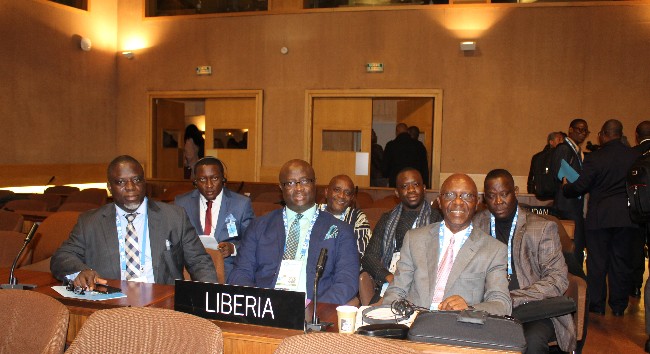Liberia, Sierra Leone to collaborate on education

Liberian delegation at UNESCO conference in France. Professor Sonii is first from right, front row
Liberia’s education minister Professor D. Ansu Sonii and his Sierra Leonean counterpart Professor Aiah Gbakima have expressed the need for the West African neighbors to collaborate to promote education programs.
The collaboration, discussed on the sidelines of the UNESCO conference in France, will be in the areas of Technical and Vocation Education (TVET) and Science, Technology, Engineering and Mathematics (STEM) education with support from UNESCO and other partners.
Professor Sonii said that Liberia places priority on its TVET programs.
He emphasized that it will help in providing skills and other employable job opportunities to school dropouts.
TVET programs will help to provide skills for them in the areas of mechanics, construction, carpentry, motorbike repair, electricity, among others, which are essential for their livelihood and survival, he said.
Minister Sonii noted that Liberia has graduated many students in several disciplines in both the private and public sectors under the ministry’s TVET program, in collaboration with higher institutions of learning.
This, he added, emphasized the need for the construction of additional TVET institutions to enhance their programs and ensure that they are fully equipped and supported financially.
Sonii also noted that Liberia places high priority on developing its STEM programs across all its regions.
He added that it would require the assistance of educational partners and other groups.
The education minister said the world has evolved into science and technology and Liberia needs to seriously promote its STEM program.
Sierra Leone’s education minister Professor Aiah Gbakima said his country was working to revive its TVET program to meet the growing needs of the country’s huge non-skilled population.
He said work has been done to ensure the development of a robust TVET policy and the development of framework for public-private partnership to increase private sector participation.
Gbakima said the goal is to expand access and improve quality of TVET, particularly in areas with high potential for job creation.
He talked about reviewing and standardizing the curriculum and certification for the program.
Professor Gbakima spoke of plans to develop a national apprenticeship scheme that can provide internship for TVET trainees and others and promote agriculture-based TVET to enhance food production and food security.
UNESCO director of policies and learning systems Borhene Chakroun welcomed the initiative of the two Mano River Union countries to prioritize and share common fronts in TVET and STEM education.
Mr. Chakroun said experience sharing and cross-border learning and capacity development will not only promote their programs but also attract donor support and show improvements in the educational programs.
He said Liberia needs to learn from areas where Sierra Leone has made progress and Sierra Leone needs to likewise.
Chakroun noted that UNESCO stands ready to support and guide the countries in those directions.
He said skills enhancement, capacity development and manpower promotion are important but they must also go along with TVET teachers’ training programs in new and innovative skills.
Isaac Yeah

